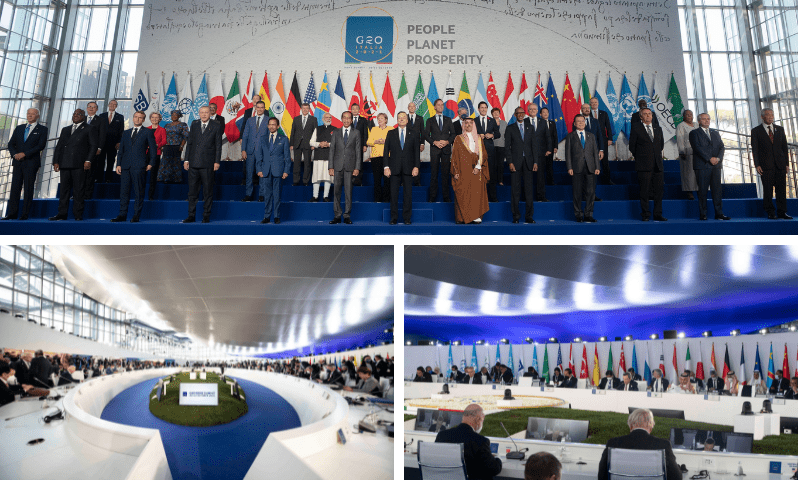At the end of two days of working sessions and side events, the G20 Leaders adopted the Rome Declaration. The document is the final outcome of an intense year of negotiations and events organized in the framework of the Italian G20 Presidency.
The Group of 20 (G20) Leaders’ Summit drew to a close on Sunday, with Italian Prime Minister Mario Draghi saying that progress on key issues including climate change, COVID-19 vaccines distribution, and global tax reform made him “profoundly optimistic” about the role multilateralism can play in global affairs.
Leaders from the world’s major economies met, virtually or in person, here in the Italian capital on Saturday and Sunday to formalize a series of agreements hammered out during around 175 ministerial negotiations, working group discussions, and other preparatory meetings held earlier in the year in the lead-up to the leaders’ summit.
MULTILATERALISM AT CENTER STAGE
“Something changed at this year’s G20,” Draghi told reporters at the conclusion of the event.
He said the summit’s success lay on its reliance on multilateralism. “We have all agreed that we cannot confront big issues like the pandemic or climate change alone.”
“I am profoundly optimistic that we can continue to work together,” said the Italian leader. “But if we start arguing and fighting among us, we will go nowhere.”
“Around this room, we have different views over how soon we must start to act and how fast we must change course,” Draghi said.
According to Vittorio Emanuele Parsi, a professor of international relations at the Catholic University of the Sacred Heart in Milan, the goal of multilateralism is “a difficult but important challenge” for the world’s largest economies.
“It is a fundamental change for countries to shift from competition to cooperation, and it will not happen easily or quickly,” Parsi told Xinhua.
GLOBAL ACCESS TO VACCINES
Sunday’s G20 Rome Leaders’ Declaration created a global target of fully vaccinating at least 40 percent of the world’s population by the end of this year and at least 70 percent by mid-2022, as recommended by the World Health Organization (WHO).
The 20-page document said countries agreed to “take steps to help boost the supply of vaccines and essential medical products and inputs in developing countries.” But it failed to call for vaccine-related intellectual property rights to be removed or for mutual recognition of vaccines endorsed by the WHO.
Asked about those points in the closing press conference, Draghi said the world has already had enough vaccines to meet the 40-percent target without taking additional steps, but countries need to work to make the safe shipment of vaccines easier and promote the production of vaccines in Africa and South America.
MINIMUM CORPORATE TAX FOR BIG MULTINATIONALS
Draghi hailed the formal adoption of a plan to create a minimum 15-percent tax rate for corporate income globally — officially the “OECD/G20 Inclusive Framework on Base Erosion and Profit Shifting,” co-authored by the Organization for Economic Cooperation and Development (OECD) — as a major step. Applied only to companies with an annual revenue of more than 867 million U.S. dollars, the system is scheduled to enter into force in 2023.
“This is something that has been discussed for 10 years or more, and only this year have countries been able to finalize a deal,” Draghi said. “It’s an extraordinary result.”
The system is aimed at removing some of the incentives for multinationals to declare income in low-tax jurisdictions. It applies the minimum tax in all jurisdictions.
If a large multinational pays a lower tax rate in any country, it will be forced to pay the difference between that tax rate and the 15-percent minimum in the country where the company is based.
CLIMATE FINANCE, GENDER EQUALITY, AND OLYMPICS
Among the high-profile accomplishments of the two-day meeting was a commitment to achieve global net zero, which includes greenhouse gas emissions or carbon neutrality by or around mid-century.
The G20 Rome Leaders’ Declaration also agreed to step up efforts initiated by economy and finance ministers and central bank governors to raise more money for climate-related finance initiatives in order to work toward the target of raising at least 100 billion U.S. dollars per year to help underwrite climate adaptation efforts in poor countries.
The declaration also highlights progress under the G20 Debt Service Suspension Initiative, or DSSI, which will allow at least 12.7 billion U.S. dollars of debt owed by poor and developing countries to developed economies to de deferred.
It also reaffirmed the G20’s commitment to gender equality, emphasizing the “pivotal role of women’s and girls’ empowerment and leadership at all levels for inclusive and sustainable development.”
The document said leaders looked forward to the Winter Olympics and Paralympics to be held next year in Beijing as “opportunities for competition for athletes from around the world, which serve as a symbol of humanity’s resilience.”
(With inputs from agencies)
A global media for the latest news, entertainment, music fashion, and more.




